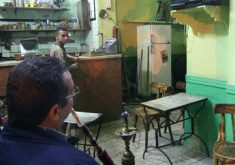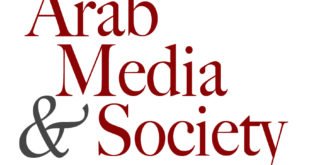In this article, Nicholas Cull reviews the performance of the United States Information Agency (USIA) during the Gulf Crisis and War of 1990-91. He concludes by contrasting the effective US use of public diplomacy during this period with the problems encountered following 9/11.
Read More »Television and the Ethnographic Endeavor: The Case of Syrian Drama
In contemporary Syria, the TV industry’s centrality renders it a particularly revealing site of ethnographic endeavor. It provides a valuable point of access to a complex and rapidly changing society, argues Christa Salamandra.
Read More »TBS 14: Satellite Chronicles
TBS continues its month-by-month record of events in the Arab and Islamic satellite world as reported in the press and by BBC Monitoring. December 2004 to May 2005 December 7 MBC Children's Channel Walid al-Ibrahim, president of Dubai-based Middle East Broadcasting Center's board of directors, announces that the station …
Read More »ARAB INTERNATIONAL MEDIA FORUM: The Change Agenda and the Arab Media
House of Lords, London 9 March 2005 Next Steps The Arab International Media Forum (AIM), held a discussion on this topic in the House of Lords. This addressed how the Arab media cover the issues of freedom, women and economic diversification, building on earlier AIM workshops in Sharjah, which revised …
Read More »THE FRONTLINE FORUM: Arab Television News and Al Jazeera
The Frontline Club, London 2 March 2005 This Frontline Forum has been made possible thanks to the generous support of the Open Society Institute. John Owen (Executive producer of newsexchange and chairman of the Frontline Forum): No one in this room needs to be told what a phenomenon Al Jazeera has …
Read More »Arabsats Get the MEMRI Treatment
"Dear Dr Bautista," the email began. "You may be interested in the Middle Eastern media ... I would therefore like to take this opportunity to introduce the Middle East Media Research Institute ... MEMRI has just launched a TV project, which monitors approximately 18-20 Arab TV stations, translates them in …
Read More »Resource Documents: ERTU Code of Ethics
1. It is prohibited to broadcast any program that includes negative statements about religions or beliefs. 2. It is prohibited to broadcast any program that creates any disputation among different religious groups. 3. It is prohibited to broadcast any program that criticizes the state national system. 4. It is prohibited …
Read More »From All Sides: In the Deadly Cauldron of Iraq, Even the Arab Media are Being Pushed Off the Story
Over the last decade, Middle Eastern history has happened, in large part, on Al Jazeera. The Qatar-based satellite channel had the only foreign reporters inside Iraq when U.S. forces launched a four-day assault, known as Operation Desert Fox, in 1998. In October 2001 its cameras -- the only ones inside …
Read More »Technical Review: Cabsat 2005
This year's CABSAT attracted around 400 companies from some 50 countries and a number of national pavilions, including the UK, China, Germany, and Korea. The event focused on three main sections: Cable & Satellite, Communications, and Broadcast & Production. It also marked the kick off of the first Middle East …
Read More »MED-TV: Kurdish Satellite Television and the Changing Relationship between the State and the Media
Since its inception, mass media in its various forms (newspapers, radio, television, etc.) has been used as both a tool of nation-states as well as a weapon against them. The power of the press to influence opinion and help interpret reality for its constituents has created conflict over what constitutes …
Read More » Arab Media & Society The Arab Media Hub
Arab Media & Society The Arab Media Hub


